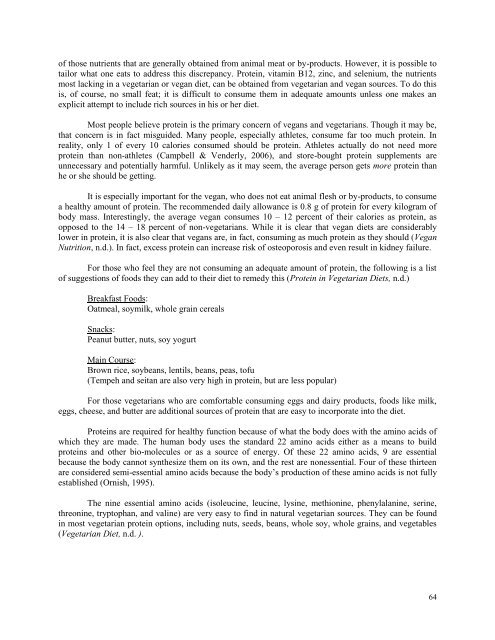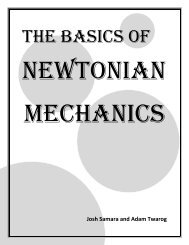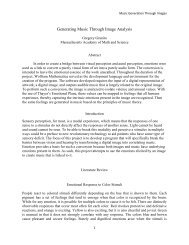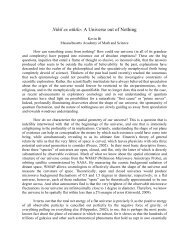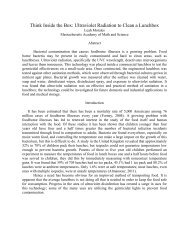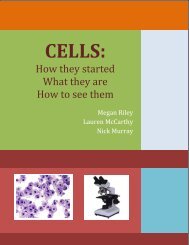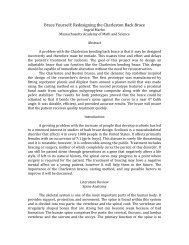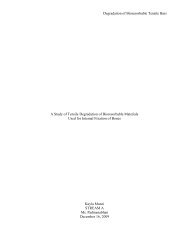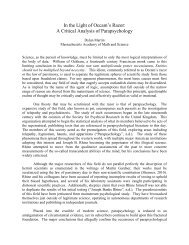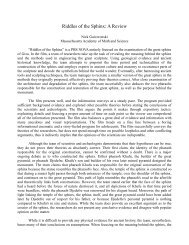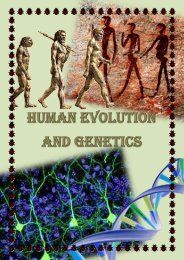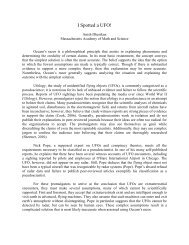Got Food? - the Scientia Review
Got Food? - the Scientia Review
Got Food? - the Scientia Review
Create successful ePaper yourself
Turn your PDF publications into a flip-book with our unique Google optimized e-Paper software.
of those nutrients that are generally obtained from animal meat or by-products. However, it is possible to<br />
tailor what one eats to address this discrepancy. Protein, vitamin B12, zinc, and selenium, <strong>the</strong> nutrients<br />
most lacking in a vegetarian or vegan diet, can be obtained from vegetarian and vegan sources. To do this<br />
is, of course, no small feat; it is difficult to consume <strong>the</strong>m in adequate amounts unless one makes an<br />
explicit attempt to include rich sources in his or her diet.<br />
Most people believe protein is <strong>the</strong> primary concern of vegans and vegetarians. Though it may be,<br />
that concern is in fact misguided. Many people, especially athletes, consume far too much protein. In<br />
reality, only 1 of every 10 calories consumed should be protein. Athletes actually do not need more<br />
protein than non-athletes (Campbell & Venderly, 2006), and store-bought protein supplements are<br />
unnecessary and potentially harmful. Unlikely as it may seem, <strong>the</strong> average person gets more protein than<br />
he or she should be getting.<br />
It is especially important for <strong>the</strong> vegan, who does not eat animal flesh or by-products, to consume<br />
a healthy amount of protein. The recommended daily allowance is 0.8 g of protein for every kilogram of<br />
body mass. Interestingly, <strong>the</strong> average vegan consumes 10 – 12 percent of <strong>the</strong>ir calories as protein, as<br />
opposed to <strong>the</strong> 14 – 18 percent of non-vegetarians. While it is clear that vegan diets are considerably<br />
lower in protein, it is also clear that vegans are, in fact, consuming as much protein as <strong>the</strong>y should (Vegan<br />
Nutrition, n.d.). In fact, excess protein can increase risk of osteoporosis and even result in kidney failure.<br />
For those who feel <strong>the</strong>y are not consuming an adequate amount of protein, <strong>the</strong> following is a list<br />
of suggestions of foods <strong>the</strong>y can add to <strong>the</strong>ir diet to remedy this (Protein in Vegetarian Diets, n.d.)<br />
Breakfast <strong>Food</strong>s:<br />
Oatmeal, soymilk, whole grain cereals<br />
Snacks:<br />
Peanut butter, nuts, soy yogurt<br />
Main Course:<br />
Brown rice, soybeans, lentils, beans, peas, tofu<br />
(Tempeh and seitan are also very high in protein, but are less popular)<br />
For those vegetarians who are comfortable consuming eggs and dairy products, foods like milk,<br />
eggs, cheese, and butter are additional sources of protein that are easy to incorporate into <strong>the</strong> diet.<br />
Proteins are required for healthy function because of what <strong>the</strong> body does with <strong>the</strong> amino acids of<br />
which <strong>the</strong>y are made. The human body uses <strong>the</strong> standard 22 amino acids ei<strong>the</strong>r as a means to build<br />
proteins and o<strong>the</strong>r bio-molecules or as a source of energy. Of <strong>the</strong>se 22 amino acids, 9 are essential<br />
because <strong>the</strong> body cannot syn<strong>the</strong>size <strong>the</strong>m on its own, and <strong>the</strong> rest are nonessential. Four of <strong>the</strong>se thirteen<br />
are considered semi-essential amino acids because <strong>the</strong> body‘s production of <strong>the</strong>se amino acids is not fully<br />
established (Ornish, 1995).<br />
The nine essential amino acids (isoleucine, leucine, lysine, methionine, phenylalanine, serine,<br />
threonine, tryptophan, and valine) are very easy to find in natural vegetarian sources. They can be found<br />
in most vegetarian protein options, including nuts, seeds, beans, whole soy, whole grains, and vegetables<br />
(Vegetarian Diet, n.d. ).<br />
64


